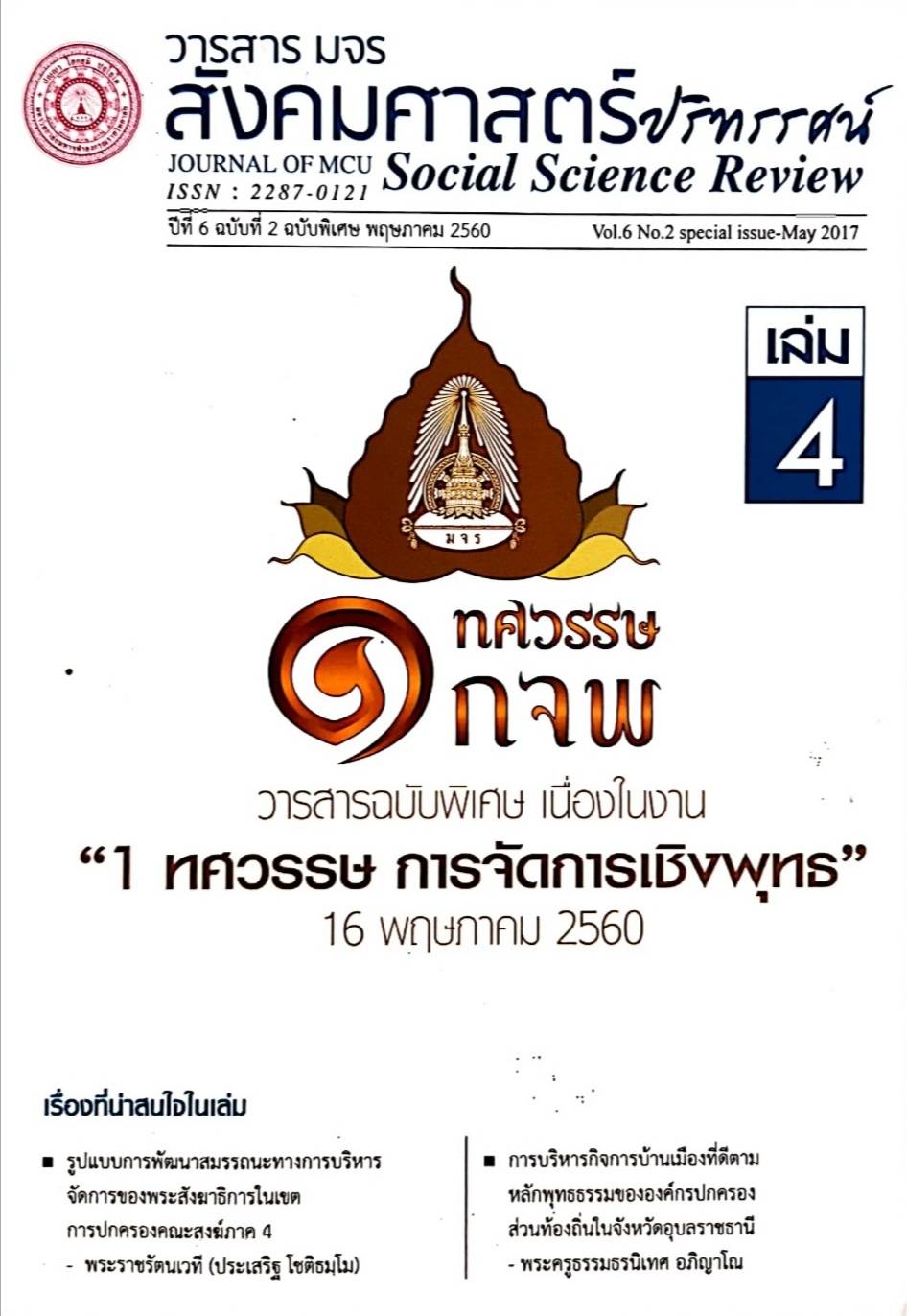กลยุทธ์การส่งเสริมความโปร่งใสตามแนวพระพุทธศาสนาเพื่อการบริหารงาน ของ องค์กรปกครองส่วนท้องถิ่นในจังหวัดหนองคาย
คำสำคัญ:
กลยุทธ์การส่งเสริมความโปร่งใส, การบริหารงานตามแนวพระพุทธศาสนาบทคัดย่อ
การวิจัยครั้งนี้มีวัตถุประสงค์ 1) เพื่อศึกษาสภาพทั่วไปการบริหารงาน ในการส่งเสริมความ
โปร่งใสตามแนวพระพุทธศาสนา เพื่อการบริหารงานขององค์กรปกครองส่วนท้องถิ่นในจังหวัด
หนองคาย 2) เพื่อศึกษาหลักพุทธธรรม เพื่อการส่งเสริมความโปร่งใสตามแนวพระพุทธศาสนา เพื่อ
การบริหารงานขององค์กรปกครองส่วนท้องถิ่นในจังหวัดหนองคาย 3) เพื่อนาเสนอกลยุทธ์ การ
ส่งเสริมความโปร่งใสตามแนวพระพุทธศาสนา เพื่อการบริหารงานขององค์กรปกครองส่วนท้องถิ่น
ในจังหวัดหนองคาย
ระเบียบวิธีวิจัยใช้การวิจัยแบบผสานวิธี ระหว่างการวิจัยเชิงปริมาณ และการวิจัยเชิง
คุณภาพ การวิจัยเชิงปริมาณเก็บข้อมูลจากลุ่มตัวอย่าง คือ ผู้บริหาร สมาชิกสภา ข้าราชการ
พนักงานและประชาชนในพื้นที่เทศบาลเมืองหนองคาย เทศบาลตาบลเฝ้าไร่และองค์การบริหาร
ส่วนตาบลจุมพล จังหวัดหนองคาย จานวน 398 คน สุ่มตัวอย่างแบบง่าย เครื่องมือเก็บข้อมูลได้แก่
แบบสอบถาม ซึ่งมีค่าความเชื่อมั่นทั้งฉบับเท่ากับ 0.933 วิเคราะห์ข้อมูลด้วยสถิติ ได้แก่ ค่าความถี่
ค่าร้อยละ ค่าเฉลี่ย และค่าเบี่ยงเบนมาตรฐาน การวิจัยเชิงคุณภาพ เก็บข้อมูลจากผู้ให้ข้อมูลสาคัญ
จานวน 17 รูป/คน เลือกแบบเจาะจงจากผู้เชี่ยวชาญ เครื่องมือในการเก็บข้อมูลได้แก่แบบสัมภาษณ์
เชิงลึกที่มีโครงสร้าง เก็บข้อมูลด้วยการสัมภาษณ์แบบตัวต่อตัว และเก็บข้อมูลจากผู้เชี่ยวชาญในการ
สนทนากลุ่มเฉพาะ 12 รูป/คน วิเคราะห์ข้อมูลทั้งสองขั้นตอนโดยการวิเคราะห์เนื้อหาเชิงพรรณา
ความ
ผลการวิจัยพบว่า
1. สภาพทั่วไปการบริหารงานในการส่งเสริมความโปร่งใสตามแนวพระพุทธศาสนา เพื่อ
การบริหารงานขององค์กรปกครองส่วนท้องถิ่นในจังหวัดหนองคาย มีระดับความคิดเห็นในเรื่อง
ของสภาพทั่วไปในการบริหารงานในการส่งเสริมความโปร่งใสตามแนวพระพุทธศาสนา เพื่อการ บริหารงานขององค์กรปกครองส่วนท้องถิ่นในจังหวัดหนองคาย มี 6 ประเด็นสาคัญ คือ (1) ระดับ
ความคิดเห็นในการสร้างเสริมความโปร่งใสด้วยหลักสุจริต 3 ตามหลักนิติธรรม โดยรวมอยู่ในระดับ
มาก มีค่าเฉลี่ยเท่ากับ 3.67 (2) ระดับของความคิดเห็นในการสร้างเสริมความโปร่งใสด้วยหลัก
สุจริต 3 ตามหลักการมีส่วนร่วม โดยรวมอยู่ในระดับมาก มีค่าเฉลี่ยเท่ากับ 3.68 (3) ระดับของ
ความคิดเห็นในการสร้างเสริมความโปร่งใสด้วยหลักสุจริต 3 ตามหลักความรับผิดชอบ โดยรวมอยู่
ในระดับมาก มีค่าเฉลี่ยเท่ากับ 3.78 (4) ระดับของความคิดเห็นในการสร้างเสริมความโปร่งใสด้วย
หลักไตรสิกขา ตามหลักนิติธรรม โดยรวมอยู่ในระดับมาก มีค่าเฉลี่ยเท่ากับ 3.69 (5) ระดับของ
ความคิดเห็นในการสร้างเสริมความโปร่งใสด้วยหลักไตรสิกขาตามหลักการมีส่วนร่วมโดยรวมอยู่ใน
ระดับมาก มีค่าเฉลี่ยเท่ากับ 3.63 (6) ระดับของความคิดเห็นในการสร้างเสริมความโปร่งใสด้วย
หลักไตรสิกขาตามหลักความรับผิดชอบ โดยรวมอยู่ในระดับมาก มีค่าเฉลี่ยเท่ากับ 3.61
2. หลักพุทธธรรมที่เหมาะสมในการบูรณาการกับหลักธรรมาภิบาลเพื่อการส่งเสริมความ
โปร่งใสตามแนวพระพุทธศาสนา เพื่อการบริหารงานขององค์กรปกครองส่วนท้องถิ่นในจังหวัด
หนองคาย มีประเด็นสาคัญ ดังนี้ (1) ส่งเสริมความโปร่งใสขององค์กรปกครองส่วนท้องถิ่น ใน
จังหวัดหนองคาย ด้วยหลักนิติธรรมบูรณาการกับหลักพุทธธรรม (ไตรสิกขา+สุจริต 3) (2) การ
ส่งเสริมความโปร่งใสขององค์กรปกครองส่วนท้องถิ่น ในจังหวัดหนองคาย ด้วยหลักความมีส่วนร่วม
บูรณาการกับหลักพุทธธรรม (ไตรสิกขา+สุจริต 3) (3) รูปแบบการส่งเสริมความโปร่งใสขององค์กร
ปกครองส่วนท้องถิ่น ในจังหวัดหนองคาย ด้วยความรับผิดชอบบูรณาการกับหลักพุทธธรรม
(ไตรสิกขา+สุจริต 3)
3. กลยุทธ์การส่งเสริมความโปร่งใสตามแนวพระพุทธศาสนา เพื่อการบริหารงานของ
องค์กรปกครองส่วนท้องถิ่นในจังหวัดหนองคาย มีการกาหนดกลยุทธ์เพื่อการบริหารจัดการ อปท.
ให้เป็นองค์กรที่มีความโปร่งใสตามแนวพระพุทธศาสนา 9 กลยุทธ์ ดังนี้ (1) กลยุทธ์การส่งเสริม
ความโปร่งใสด้วยหลักนิติธรรมในการบริหารงานด้วยความเที่ยงตรงและมั่นคง (2) กลยุทธ์การ
ส่งเสริมความโปร่งใสด้วยหลักนิติธรรมในงานบริหารงบประมาณด้วยความซื่อสัตย์สุจริตและไม่คด
โกง (3) กลยุทธ์การส่งเสริมความโปร่งใสด้วยหลักนิติธรรมในพัฒนาบุคคลากรด้วยความเสมอภาค
และไม่อคติเอนเอียง (4) กลยุทธ์การส่งเสริมความโปร่งใสด้วยหลักความรับผิดชอบในการ
บริหารงานโดยการส่งเสริมสัมมาอาชีพ (5) กลยุทธ์การส่งเสริมความโปร่งใสด้วยหลักความ
รับผิดชอบในการบริหารงบประมาณเพื่อส่งเสริมพัฒนาชีวิต (6) กลยุทธ์การส่งเสริมความโปร่งใส
ด้วยหลักความรับผิดชอบในการอยู่ร่วมของคน ชุมชนและธรรมชาติสิ่งแวดล้อม (7) กลยุทธ์การ
ส่งเสริมความโปร่งใสด้วยหลักการมีส่วนร่วมในการบริหารงานโดยร่วมคิด ร่วมทา และร่วมปฏิบัติ
(8) กลยุทธ์การส่งเสริมความโปร่งใสด้วยหลักการมีส่วนร่วมในการบริหารงบประมาณด้วยความ
ซื่อสัตย์สุจริตและมุ่งประโยชน์ส่วนรวม (9) กลยุทธ์การส่งเสริมความโปร่งใสด้วยหลักการมีส่วนร่วม
ในการพัฒนาบุคลากรให้มีจิตสาธารณะและสร้างสรรค์สังคม
เอกสารอ้างอิง
the key into excellence. Doctorate dissertation on Public Administration,
National Institute of Development Administration.
Jintana Binmas & et al. (1986). “Trait and characteristics of Civil Servant” Research
Report, Asia Foundation, Institute for Civil Service development, Office of
civil service commission.
Dereck theangfung (2006).“Integrative Strategy of the province governor’s
administration for strengthen competitive potential of provinces in
Thailand” Doctorate dissertation on public Administration. Graduate
school, University of Rajapat Suandusit.
Trakul Chamnan (2000). “Strategy of Human Resource Development according to
Buddhism, Research Report. Mahamakutrajavidyalaya University, Chaingmai,
Boonsaeng Cheeraphakorn. (2009). “Leadership and Administration of Local
government Organization”. Doctorate Dissertation (Public Administration).
Graduate School: Ramkhamhaeng University.
Paiboon Phosuwan. (2008). “Strategy of Local Development into efficiency: A Case
Study of Local Government in Thailand”. Doctorate Dissertation. Faculty of
Political Science, Thammasat University.
ดาวน์โหลด
เผยแพร่แล้ว
รูปแบบการอ้างอิง
ฉบับ
ประเภทบทความ
สัญญาอนุญาต
ลิขสิทธิ์ (c) 2020 วารสาร มจร สังคมศาสตร์ปริทรรศน์

อนุญาตภายใต้เงื่อนไข Creative Commons Attribution-NonCommercial-NoDerivatives 4.0 International License.
เพื่อให้เป็นไปตามกฎหมายลิขสิทธิ์ ผู้นิพนธ์ทุกท่านต้องลงลายมือชื่อในแบบฟอร์มใบมอบลิขสิทธิ์บทความให้แก่วารสารฯ พร้อมกับบทความต้นฉบับที่ได้แก้ไขครั้งสุดท้าย นอกจากนี้ ผู้นิพนธ์ทุกท่านต้องยืนยันว่าบทความต้นฉบับที่ส่งมาตีพิมพ์นั้น ได้ส่งมาตีพิมพ์เฉพาะในวารสาร มจร สังคมศาสตร์ปริทรรศน์ เพียงแห่งเดียวเท่านั้น หากมีการใช้ภาพหรือตารางหรือเนื้อหาอื่นๆ ของผู้นิพนธ์อื่นที่ปรากฏในสิ่งตีพิมพ์อื่นมาแล้ว ผู้นิพนธ์ต้องขออนุญาตเจ้าของลิขสิทธิ์ก่อน พร้อมทั้งแสดงหนังสือที่ได้รับการยินยอมต่อบรรณาธิการ ก่อนที่บทความจะได้รับการตีพิมพ์ หากไม่เป็นไปตามข้อกำหนดเบื้องต้น ทางวารสารจะถอดบทความของท่านออกโดยไม่มีข้อยกเว้นใดๆ ทั้งสิ้น





